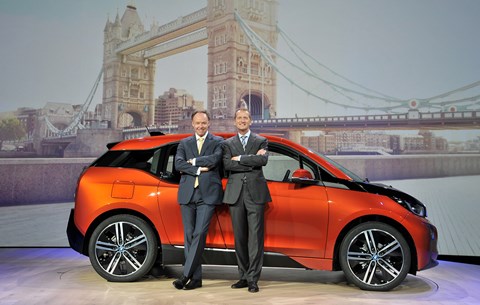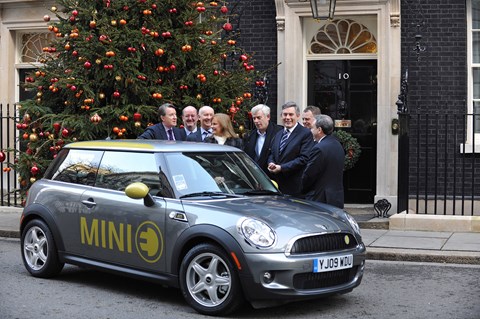► Rivals playing catch-up with BMW
► Munich chief hails ‘EV leadership’
► Electric car trend gains momentum
BMW is counting the days until Audi, Mercedes-Benz and Jaguar bring their electric cars to market, in the hope it will trigger an upsurge in EV sales and hasten the introduction of range-boosting battery technology.
Having launched its premium electromobility programme with the i3 in 2014 (and subsequent i8 hybrid sports car), BMW is in the somewhat counter-intuitive position of wanting European rivals to catch up. Dr Ian Robertson, BMW board member for sales and marketing, described the creation of a virtuous circle as rival EVs enter production: ‘It will be good for all of us. There will be greater volume potential, more charging infrastructure, more consumers exposed to EV, more excited customers talking about it: the more the merrier!’
The electric revolution is coming…
Jaguar’s iPace, recently driven by CAR, and Audi’s ‘Q6’ e-tron, go on sale in 2018, with Mercedes-Benz’s EQ programme not far behind. Robertson is confident that BMW has an ‘edge’ in its technology, established customer base and customer experience: the ‘Project i’ electromobility programme took three years to clock up 100,000 sales, but BMW expects to sell the same number of EVs and plug-in hybrids in 2017 alone.
‘By the end of this decade, we will have 400-500,000 [electrified] cars on the road,’ says Robertson. ‘Some companies are making great announcements about EVs in 2019, 2020, that’s fine, that’s great. Our technology road map is clear to us: we’ll get to a point in 2025, where the [electrified] share of BMW sales is 20 to 30%. But of course that still means the internal combustion engine is still in the majority.’
More electric cars will boost economies of scale to help bring down the cost of battery cells, furthering the virtuous circle. ‘The battery-electric tech developments are very exciting and will make a massive stepchange, and solid state batteries are one of those,’ adds the former Rolls-Royce Motor Cars’ chairman. Switching the battery’s electrolyte from liquid to a more dense substance such as a ceramic or polymer will boost the energy capacity, but the solid-state battery is proving hard to industrialise.
BMW’s next all-new i car – referred to as iNext – won’t arrive until 2021, which gives an advantage to Audi, Jaguar, Mercedes and Tesla with their fresher electric cars. BMW does have the 530e iPerformance, i8 roadster and Mini Countryman hybrids in the interim, along with a pure electric X3 and Mini.
Will Brexit affect where the electric Mini is built?
The Mini E, expected to have a slimmed-down version of the i3 94Ah’s battery pack and motor, is due in production in 2019. The smaller battery pack could halve the i3’s 195-mile range, but Robertson says BMW’s EV customers typically only drive 30km (19 miles) a day anyway.

Will the UK’s decision to leave the European Union affect Plant Oxford’s chance of assembling the Mini E? ‘It’s too early to say,’ answers Robertson. ‘At the end of the day, it’s an engine derivative of the Mini that’s produced in the UK, it’s not a completely new Mini or a new platform generation.’
BMW’s strategy is to establish production sites ideally in key sales markets; Mini’s British heritage and BMW’s Rover ownership were historical reasons for Plant Oxford being established, the annual total of 250,000 group sales in the UK is a current incentive.
‘[When making these decisions] we tend not to look at short-term issues such as currency,’ explains Robertson. ‘We live in a world where currencies go up and down. If you see a currency weaken, does that affect our strategic direction? Absolutely not. Are we looking at scenarios for what Brexit could turn into? Yes, but it’s not the main driver of the decision, it’s just one element.’
BMW reviews by CAR magazine
